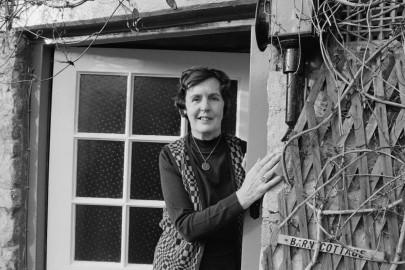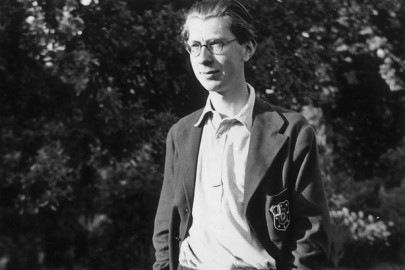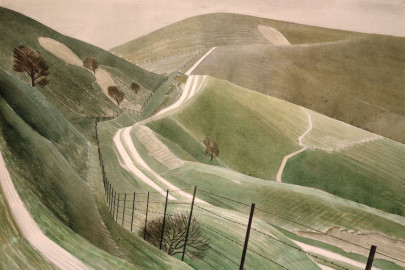Readers of Nigeness will know that I recently reread Samuel Beckett’s Malone Dies. Having consulted Amazon, I see that it qualifies for a 1p Book Review, so here goes…
Malone Dies, published in French in 1951 and English (translated by the author) in 1956, is classed by some – not the French, nor Beckett – as the middle novel of a ‘Trilogy’, flanked by Molloy and The Unnamable. Not only does it stand perfectly well alone, it is arguably the most readable of Beckett’s mature novels, and might even serve as a good introduction to his fiction.
The narrator, the aged and bedridden Malone, loses no time in telling us that ‘I shall soon be quite dead at last in spite of all’. He’s not entirely sure about his identity, and has little idea how he got to the particular bed in which he is ridden, where his needs are attended to in the most basic manner by persons unknown. To pass the time until he is done with everything, he resorts to various shifts, including a succession of narratives, which seldom last long before they are brusquely cut off with a ‘What tedium’ or ‘This is awful’ – Malone, self-editing all the time, is his own harshest critic.
The most developed narratives concern a strange boy called Saposcat (Sapo for short), who becomes fascinated by the life of a family of peasants – this story includes an unforgettable description of the burial of a defunct mule – and, after that, a derelict called Macmann who is taken into some kind of charitable institution, where he has a, um, relationship, to the best of his ability, with a grotesque woman called Moll, and is mistreated by various members of staff. This narrative is the one that finally sticks, carrying the novel to its shocking end, one of the most extraordinary in modern fiction.
Yes I know, it doesn’t sound like a barrel of laughs, does it? But the thing that makes Beckett so unexpectedly, grippingly readable is the tone of voice, which is that of a deadpan gallows humorist with an absolute mastery of prose style, a wholly original mind and a piercing eye. Consider the lugubrious humour in such a pithy, precisely phrased sentence as this: ‘Ah yes, I was always subject to the deep thought, especially in the spring of the year.’ Or, as Malone ponders the possibility of an afterlife: ‘But sufficient unto the day, let us first defunge, then we’ll see.’ For all his reputation as a grim absurdist – and for all his grim subject matter – Beckett is essentially a comic writer, keeping a straight face while finding the vitality of life in its very absurdity.
Here is a passage which begins with a wonderfully vivid account of the bird life in the grounds of Macmann’s charitable institution and takes off into… well, see for yourself:
The birds. Numerous and varied in the dense foliage they lived without fear all the year round, or in fear only of their congeners, and those which in summer or winter flew off to other climes came back the following winter or the following summer, roughly speaking. The air was filled with their voices, especially at dawn and dusk, and those which set off in flocks in the morning, such as the crows and starlings, for distant pastures, came back the same evening all joyous to the sanctuary, where their sentinels awaited them. The gulls were many in stormy weather which paused here on their flight inland. They wheeled long in the cruel air, screeching with anger, then settled in the grass or on the house-tops, mistrustful of the trees. But that is all beside the point, like so many things. All is pretext, Sapo and the birds, Moll, the peasants, those who in the town seek one another out and fly from one another, my doubts which do not interest me, my situation, my possessions, pretext for not coming to the point, the abandoning, the raising of the arms and going down, without further splash, even though it may annoy the bathers. Yes, there is no good pretending, it is hard to leave everything. The horror-worn eyes linger abject on all they have beseeched so long, in a last prayer, the true prayer at once, the one that asks for nothing. And it is then a little breath of fulfilment revives the dead longings and a murmur is born in the silent world, reproaching you affectionately with having despaired too late. The last word in the way of viaticum. Let us try it another way…
If that isn’t great prose, I don’t know what is.












That quote should read ‘I was always subject to the deep thought…’
It does now – Ed.
I think the greatness of Beckett is that, like Larkin, he stared the big human issue full in the face, but retained his sense of humour.
I was introduced to Beckett by my sainted English teacher Dick Shone (who lived in a Dick-Shone-ry, ho ho!, we quipped). He remains the funniest writer I have ever read, a model and an inspiration. There are far too many quotable lines, but one of my favourites is the opening of “From An Abandoned Work”. As Nige says, unexpectedly, grippingly readable:
‘Up bright and early that day, I was young then, feeling awful, and out…”
Yep, having never made a start on Beckett’s novels, this is one I really have to buy and read.